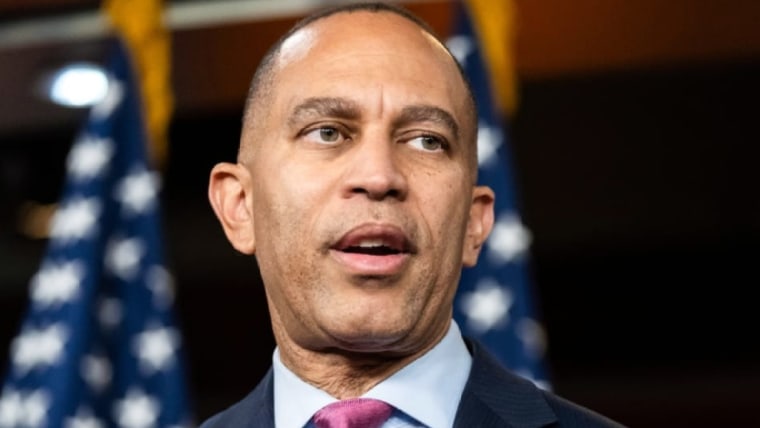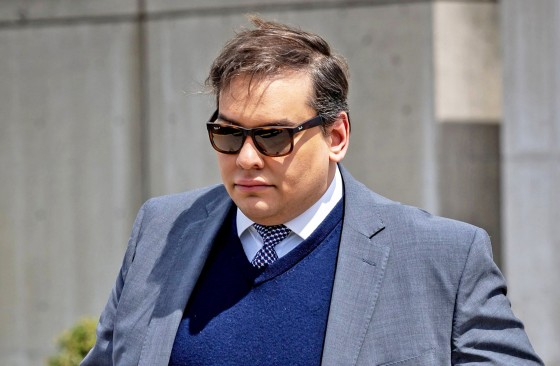Disgraced former Rep. George Santos had served just three months of a seven-year prison sentence for fraud when President Donald Trump gave him a commutation last week.
The news was a shock to the disabled Navy veteran he defrauded, but not surprising to legal experts who have been tracking Trump’s expansive use of the pardon power.
At this stage in his second term, Trump has far exceeded the clemency record of his first stint in the Oval Office, and he has front-loaded these actions compared to past presidents, who typically issued pardons and commutations in their final days in office. So far, less than a year into his second term, the president has granted clemency to more than 1,600 people, according to the Justice Department’s website, far exceeding the level of most presidents in a full four-year term.
The bulk of those actions went to Jan. 6, 2021, Capitol riot offenders. Those offenders protested the results of the 2020 election, which Trump continues to falsely claim was stolen due to widespread voter fraud.
On his first day as president, Trump fulfilled a campaign vow with the bulk pardons.
On his first day as president, Trump fulfilled a campaign vow with the bulk pardons, relieving his supporters in mass who faced investigations for their actions on Jan. 6. Trump ran his 2024 president campaign while facing four criminal cases, dismissing his prosecutions as retribution from his political opponents.
After Trump won November’s general election, all of those cases were dismissed in line with longstanding tradition that prevents the Justice Department from prosecuting a sitting American leader. Last week, Trump even encouraged Israeli President Issac Herzog to pardon Prime Minister Benjamin Netanyahu, who is on trial for alleged corruption in three separate cases. “Cigars and champagne — who the hell cares about this?” he told Israel’s parliament.
It’s no surprise that most of Trump’s clemency actions have also focused on individuals he has deemed victims of politically motivated prosecutions, including nearly two dozen anti-abortion activists. Many such activists were accused of violating the Freedom of Access to Clinic Entrances, or FACE, Act for obstructing the entrances to reproductive health care clinics.

Other beneficiaries include white-collar criminals like Santos. Trump’s clemency grant to Santos clears him of his obligation to pay $373,749.97 to his victims for his crimes, including “campaign donors, political parties, government agencies, elected bodies, his own family members, and his constituents,” the U.S. attorney for the Eastern District of New York said in an April statement.
The justice system has lost more than $1 billion in fines, forfeitures and restitution as a result of the president’s pardons, according to Liz Oyer, a former Justice Department pardon attorney who tracks the activity in a database. Such losses can prevent victims from receiving debts owed to them, or the government from collecting on expected revenue.
“President Trump has applied the same norm-busting approach to the pardon power as he has to other aspects of his presidency,” said Jeffrey Crouch, an associate professor at American University with an expertise in executive clemency powers, by email. “Like in his first term, he seems unconcerned by blowback related to controversial pardons of political allies and celebrities.”
“Legally, he has a lot of flexibility to use the clemency power as he sees fit,” he added.
The president’s move to pardon Santos came days after the former representative penned an open letter to the sitting president in a local Long Island newspaper. Santos pleaded guilty in his case, where he was accused of wire fraud and identity theft. Republican Marjorie Taylor Greene also advocated for his release.
Former President Joe Biden issued a series of controversial pre-emptive pardons in his final days in office.
Former President Joe Biden issued a series of controversial pre-emptive pardons in his final days in office, including for his son Hunter Biden and other Biden family members. Anthony Fauci, who became the face of the federal government’s response to the Covid-19 pandemic, was also included on the list after he became a target of Republicans’ political ire. Members of the congressional committee that investigated the Jan. 6 riot were covered, too.
Biden still holds the record for the acts of clemency during a single term with 4,245 instances, according to the Pew Research Center.
Earlier this year, Trump appointed a pardon czar, Alice Marie Johnson, a 70-year-old woman who spent decades in jail as a first-time, nonviolent drug offense. Reality television star Kim Kardashian played a key role in lobbying for her release. Johnson was sentenced to life in prison before Trump commuted her sentence and later granted her a full pardon.
Supporters of the president, like Santos, have received the early share of his clemency actions. The president told reporters that Sean “Diddy” Combs, the rapper sentenced to prostitution charges earlier this year, had asked for a pardon, despite Trump describing Combs as “very hostile” toward him as a politician, though they previously had a cordial relationship.
“If I think someone was mistreated, it wouldn’t matter whether they like me or don’t,” Trump told reporters. “I’ll take a look at it.”
Subscribe to the Project 47 newsletter to receive weekly updates on and expert insight into the key issues and figures defining Trump’s second term.
